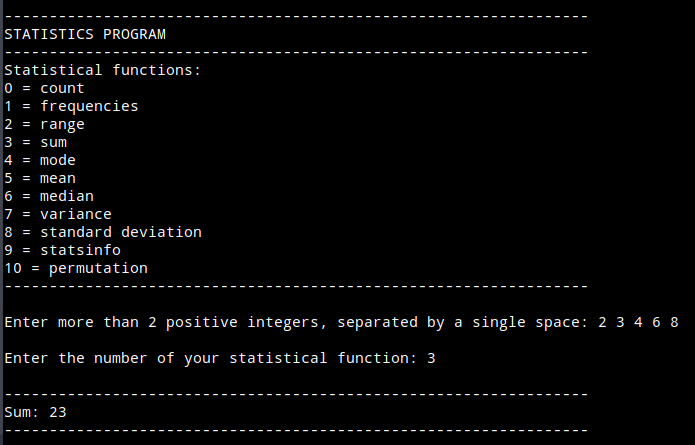1. Modules
2. Useful modules
3. Own module
4. Example I: date & time
5. Example IIa: statistics
5. Example IIb: statistics
6. Example III: markdown
7. Example IV: wrap texts
8. Example V: compare str
9. Example VI: tidy
10. Example VII: regex
11. Example VIII: convert
Challenges
...under construction...
4. Practical example
Below an example using two statistical modules.
#!/usr/bin/perl
use Statistics::Lite qw(:all);
use Algorithm::FastPermute ('permute');
sub validate {
$data = shift;
$data =~ s/\h+/ /g; # replace multiple horizontal space to one single space
if($data =~ (/^[0-9 ]+$/) and (length($data) > 2) ) { # minimal two integers and a space, i.e. 1 2
return 1;
}
else {
return 0;
}
}
$sep = "\n" . ("-" x 65) . "\n";
print($sep);
print("\UStatistics program");
print($sep);
print("Statistical functions:\n0 = count\n1 = frequencies\n2 = range\n3 = sum\n4 = mode\n5 = mean\n6 = median\n7 = variance\n8 = standard deviation\n9 = statsinfo\n10 = permutation");
print($sep);
print("\nEnter more than 2 positive integers, separated by a single space: ");
chomp($numbers = <STDIN>);
if(validate($numbers)) {
print("\nEnter the number of your statistical function: ");
chomp($stat = <STDIN>);
print($sep);
if($stat < 0 or $stat > 10) {
print("Valid number statistical function required!\nSelect a number between 0 and 10 (inclusive).");
}
else
{
@data = split(" ", $numbers);
# start 10 statistical functions
print("Count: " . count(@data)) if($stat == 0);
if($stat == 1) {
%datas = frequencies(@data);
print("No" . " " . "Freq" . "\n");
foreach $k (keys(%datas)) {
print($k . " " . $datas{$k} . "\n");
}
}
print("Range: " . range(@data)) if($stat == 2);
print("Sum: " . sum(@data)) if($stat == 3);
print("Mode: " . mode(@data)) if($stat == 4);
print("Mean: " . mean(@data)) if($stat == 5);
print("Median: " . median(@data)) if($stat == 6);
print("Variance: " . variance(@data)) if($stat == 7);
print("Standard deviation: " . stddev(@data)) if($stat == 8);
print("Statsinfo:\n" . statsinfo(@data)) if($stat == 9);
if($stat == 10) {
sub factorial
{
$n = shift;
$i = 1;
$result = 1;
$result *= ++$i while $i < $n;
$result;
}
$no_elements = @data;
$f = factorial($no_elements);
permute {
(++$count < $f) ? print "@data\n" : print "@data";
} @data;
}
}
}
else {
print("Valid data required!");
}
print($sep . "\n");